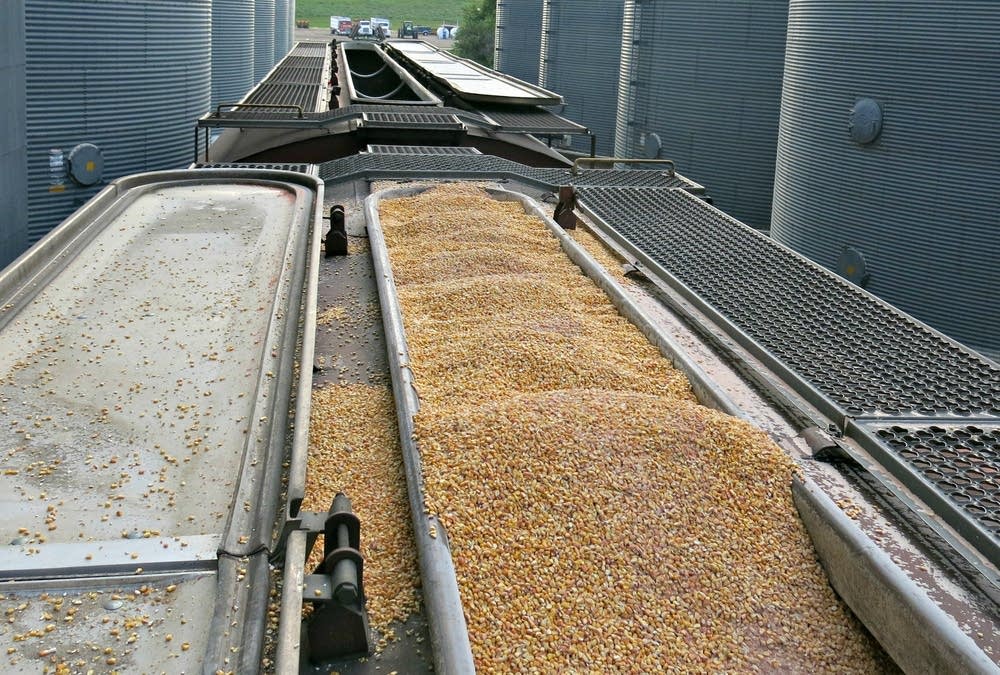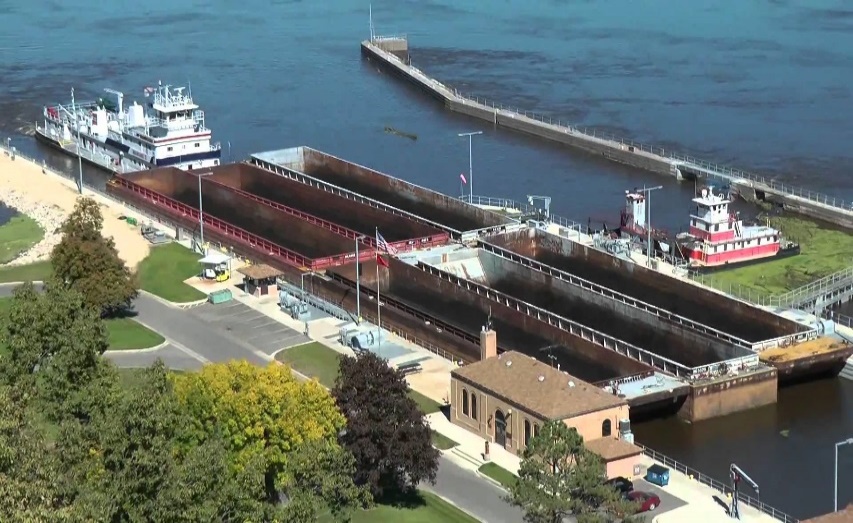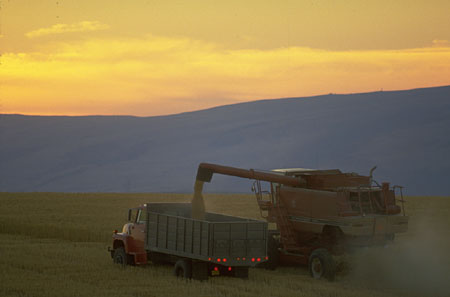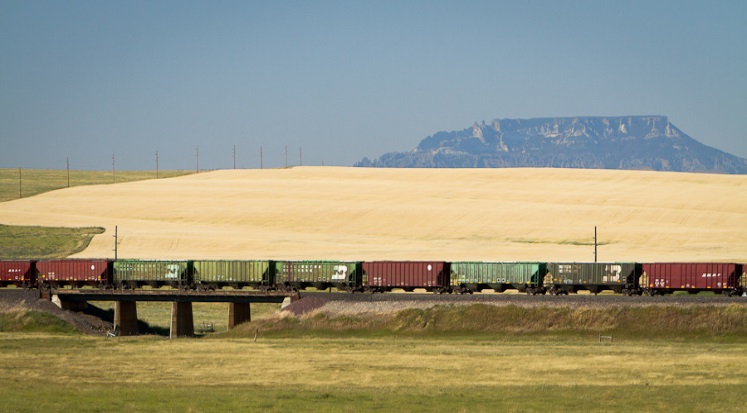2017 Agricultural Shipper Needs Survey -
Instrument(s) for Navigation Improvement Survey(s)
Attachment 1 - Ag Survey Mail questionaire
2017 Agricultural Shipper Needs Survey -
OMB: 0710-0018
OMB CONTROL NUMBER: 0710-0018
OMB EXPIRATION DATE: 11/30/2019
2017 Agricultural Shipper Needs Survey:
Upper Mississippi River System




Sponsored by:
United States Army Corps of Engineers and Washington State University
The
public reporting burden for this collection of information,
0710-0018, is estimated to average 15 minutes per response,
including the time for reviewing instructions, searching existing
data sources, gathering and maintaining the data needed, and
completing and reviewing the collection of information. Send
comments regarding the burden estimate or burden reduction
suggestions to the Department of Defense, Washington Headquarters
Services, at
[email protected].
Respondents should be aware that notwithstanding any other provision
of law, no person shall be subject to any penalty for failing to
comply with a collection of information if it does not display a
currently valid OMB control number.

RETURN YOUR COMPLETED QUESTIONNAIRE TO:
Social & Economic Sciences Research Center
Washington State University
PO Box 641801
Pullman, WA 99164-1801
Shipment Information
 «NAME»
«NAME»
Choice: Consider your last shipment from this elevator: «ADDRESS1»
«CITY», «STATE» «ZIP»
Q1. What is the primary commodity you ship from this elevator? _____________ commodity
Q2. At this location, do you have loading capabilities for…
Yes No
▼ ▼
Trucks 1 2
Rail Cars 1 2
c. Barges 1 2
Q2b. If YES to Rail loading capability, what is your rail car loading capacity?
______ # of cars
Q2c. If NO to Rail loading capability, how close is the nearest rail loading facility to this elevator?
_______ miles
Q2d. If NO to Barge loading capability, how close is the nearest barge loading facility to this elevator?
_______ miles
Your last Freight Shipment
Q3. What commodity was shipped in your last shipment? _____________ commodity
Q4. Where was this commodity shipped to? ____________________________ city ___________ state
Q4b. What type of destination is this?
1 River terminal 2 Another Elevator 3 Railroad terminal 4 Processing Plant
5 Other (specify): ________________________
Q5. How large was this shipment (payload weight)?
_____________________________ payload weight, in
1 Tons 2 Hundred Weight (Cwt)* 3 Gallons
4 Bushels 5 Shipment 6 Other (specify): _________________
* Cwt used throughout
Q6. What type of transportation was used for this shipment, approximately what
distance did each travel (in miles), and what was the transportation rate?
Mode Distance Transportation Per Unit type for commodity
(check if used) Traveled Rate Tons Cwt Gallons Bushels Shipment Other (specify)
▼ ▼ ▼ ▼ ▼ ▼ ▼ ▼ ▼
Truck __________ miles $_________ rate 1 2 3 4 5 6 _________
Rail __________ miles $_________ rate 1 2 3 4 5 6 _________
Barge __________ miles $_________ rate 1 2 3 4 5 6 _________
Total Distance
Traveled Total Cost Tons Cwt Gallons Bushels Shipment Other (specify)
▼ ▼ ▼ ▼ ▼ ▼ ▼
Total Shipment _________ miles $_________rate 1 2 3 4 5 6 _________
Q7. What do you estimate was the shipment time (include scheduling time, wait for equipment and transit time)?
_________ days + _________ hours.
Q8. How reliable is the service? That is, for shipments like this one, what percent of the time do you expect them to arrive on time?
__________ percent on-time arrivals
Q9. What price did you receive for your commodity at the destination terminal?
__________ dollars per unit
1 Tons 2 Cwt 3 Gallons 4 Bushels 5 Shipment 6 Other (specify): _________________
Shipping Alternatives
We want to know what options you could take if the mode and destination you used for your last shipment had not been available and would never be available. For example, if the rail system were shut down, shippers who used rail could use truck instead of rail, or could use barge with truck access to a barge loading facility, or could have sent the shipment to a different destination. We need to know what these alternatives are for you. Nearly everyone has some kind of shipping alternatives. If not, then the only alternative is to shut down and go out of business. Please provide us with information on these alternatives for you.
Q10. If the mode and destination you used for your last shipment had not been available and would never be available, what would you do?
1 Shut down and go out of business skip to Q25
2 Continue your operations but in a different, perhaps costlier way
First Shipping Alternative
Q11. Where would this commodity be shipped to? ____________________ city _______ state
Q11b. What type of destination is this?
1 River terminal 2 Another Elevator 3 Railroad terminal 4 Processing Plant
5 Other (please specify): ________________________
Q12. What transportation would be used for this shipment, approximately what distance would each travel (in miles) and what would be the transportation rate?
Mode Distance Transportation Per Unit type for commodity
(check if used) traveled rate Tons Cwt Gallons Bushels Shipment Other (specify)
▼ ▼ ▼ ▼ ▼ ▼ ▼ ▼ ▼
Truck __________ miles $________ rate 1 2 3 4 5 6 _________
Rail __________ miles $________ rate 1 2 3 4 5 6 _________
Barge __________ miles $________ rate 1 2 3 4 5 6 _________
Estimate of
Total Distance Estimate of Per Unit type for commodity
Traveled Total Cost Tons Cwt Gallons Bushels Shipment Other (specify)
▼ ▼ ▼ ▼ ▼ ▼ ▼ ▼
Total Shipment ________ miles $________rate 1 2 3 4 5 6 _________
Q13. What do you estimate would be the shipment time (include scheduling time,
wait for equipment and transit time)?
_________ days + _________ hours.
Q14. How reliable would the service be? That is, for shipments like this one, what percent
of the time would you expect them to arrive on time?
__________ percent on-time arrivals
Q15. How large would your shipment be (payload weight)?
_____________________________ payload weight, in
1 Tons 2 Cwt 3 Gallons 4 Bushels 5 Other (specify): ____________________
Q16. What price would you receive for your commodity at the destination terminal?
__________ dollars per unit
1 Tons 2 Cwt 3 Gallons 4 Bushels 5 Shipment 6 Other (specify): __________________
Other Shipping Alternatives
Please complete the table below for your other shipping alternatives. If you have no other alternatives, skip to Q24
|
Second Alternative |
Third Alternative |
Q17. Where would it be shipped to? |
______________ city _______ state
|
______________ city _______ state
|
Q18. What type of destination is this? |
1 River terminal 2 Another Elevator 3 Rail terminal 4 Processing Plant 5 Other (specify): _______________ |
1 River terminal 2 Another Elevator 3 Rail terminal 4 Processing Plant 5 Other (specify): _______________ |
Q19a. What type of transportation modes would be used for this shipment? |
Mode Distance Transportation (Check if used) traveled rate ▼ ▼ ▼ Truck _____miles ____rate Rail _____miles ____rate Barge _____miles ____rate
1 Tons 2 Cwt 3 Gallons 4 Bushels 5 Shipment 6 Other (specify):__________________
|
Mode Distance Transportation (Check if used) traveled rate ▼ ▼ ▼ Truck _____miles ____rate Rail _____miles ____rate Barge _____miles ____rate
1 Tons 2 Cwt 3 Gallons 4 Bushels 5 Shipment 6 Other (specify):__________________
|
Q19b. What is the total distance and total cost for this shipment? |
Total Total Distance Cost Total Shipment ________Miles $ _______rate
1 Tons 2 Cwt 3 Gallons 4 Bushels 5 Shipment 6 Other (specify):__________________
|
Total Total Distance Cost Total Shipment ________Miles $ ______
1 Tons 2 Cwt 3 Gallons 4 Bushels 5 Shipment 6 Other (specify):_________________ |
Q20. What do you estimate would be the shipment time? |
_____ days + _____ hours |
_____ days + _____ hours |
Q21. How reliable would the service be? |
_____% on-time arrivals |
_____% on-time arrivals |
Q22. How large would the shipment be? |
__________ payload weight
1 Tons 2 Cwt 3 Gallons 4 Bushels 5 Other (specify): _____________________ |
__________ payload weight
1 Tons 2 Cwt 3 Gallons 4 Bushels 5 Other (specify): ______________________
|
Q23. What estimated price would you receive for your commodity at the destination terminal? |
__________ dollars
1 Tons 2 Cwt 3 Gallons 4 Bushels 5 Shipment 6 Other (specify): |
__________ dollars
1 Tons 2 Cwt 3 Gallons 4 Bushels 5 Shipment 6 Other (specify): |
Best Alternative Choice
Q24. Of the alternative shipments, if any, what is your “preferred alternative”? That is, if you could not make the shipment you made what shipment would you have made?
1 First Alternative
2 Second Alternative
3 Third Alternative
4 Other Alternative (specify): _____________________
Transportation Rates
In each of the next three questions relating to rate and service changes, please regard the changes as permanent changes. Also, if you marked you have no alternatives in Q10, page 3, please consider “out-of-business” as your alternative.
Q25. For your last shipment, if the transportation rate increased «Percent_change1»%, would you continue with the original mode and destination or switch to your best alternative choice?
1 Continue to use Original mode
2 Switch to Best Alternative Choice Skip to Q26
3 Go out-of-business Skip to Q26
Q25b. If you would continue to use your Original mode, what percentage increase in the transportation rate would be necessary to cause you to switch to the Alternative transportation mode?
______ % increase
Transit Time
Q26. For your last shipment, if the transit time (including scheduling and wait for equipment) for the original option increased «Percent_change2»%, would you continue with the original mode and destination or switch to the alternative at this location?
1 Continue to use Original mode
2 Switch to Best Alternative Choice Skip to Q27
3 Go out-of-business Skip to Q27
Q26b. If you would continue to use your Original mode, what percentage increase in the transit time would be necessary to cause you to switch to the Alternative transportation mode?
______ % increase
Reliability
Q27. For your last shipment, if the reliability (percentage of time shipments arrived on-time) of the original option decreased «Percent_change3»%, would you continue with the original mode and destination or switch to the alternative at this location?
1 Continue to use Original mode
2 Switch to Best Alternative Choice Skip to Q28
3 Go out-of-business Skip to Q28
Q27b. If continue to use Original mode, what percentage decrease in the reliability would be necessary to cause you to switch to the Alternative transportation mode?
______ % decrease
Volume
Q28. If the average transportation rate you pay increased by «Percent_change4»%, would your annual volume shipped decrease (assume the rate increase applies to BOTH you and to your competitors)?
1 Yes
2 No Skip to Q29
Q28b. If yes, by how much would the volume decrease (assuming the rate increase applies to both you and to your competitors)?
__________ volume decrease
Q29. If the average transportation rate you pay increased by «Percent_change5»%, would your annual volume decrease (assume that the rate increase applies ONLY to your firm and NOT to your competitors)?
1 Yes
2 No Skip to Q30
Q29b. If yes, by how much would the volume decrease (assuming that the rate increase applies ONLY to your firm and NOT to your competitors)?
__________ volume decrease
Q30. If the average time in transit increased by «Percent_change6»%, would your annual volume decrease?
1 Yes
2 No skip to Q31
Q30b. If yes, by how much would the volume decrease?
__________ volume decrease
Q31. If the average time that shipments arrive on-time decreased by «Percent_change7»%, would your annual volume decrease?
1 Yes
2 No skip to Q32
Q31b. If yes, by how much would the volume decrease?
__________ volume decrease
Shipper Characteristics
Q32. How long has this elevator been at its current location?
_____ years
Q33. How large is your elevator?
__________________ Total Amount of Annual Units Shipped
please check the type of unit for this elevator
1 Tons 2 Cwt 3 Gallons 4 Bushels 5 Other (specify): __________________
__________________ Total Amount of Storage Capacity
1 Tons 2 Cwt 3 Gallons 4 Bushels 5 Other (specify): __________________
Q34. Does your firm (or parent firm) own export or import facilities?
1 Yes
2 No
Q35. How many facilities such as this one does your firm own and/or operate?
_______________ number of elevators.
Q36. Thank you for your help with this study. We would welcome any additional comments you would like to provide about shipping.

Please return your completed questionnaire to:
Social & Economic Sciences Research Center
Washington State University
PO Box 641801
Pullman, WA 99164-1801
(Form: ELVA-17 20170718)
«ID» - 1
| File Type | application/vnd.openxmlformats-officedocument.wordprocessingml.document |
| File Title | 2006 Survey of Agricultural Shipping Needs in the Midwest |
| Author | kent |
| File Modified | 0000-00-00 |
| File Created | 2021-01-21 |
© 2026 OMB.report | Privacy Policy